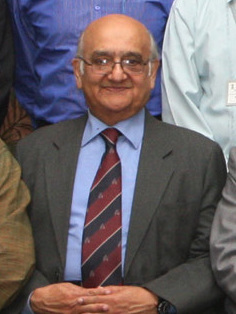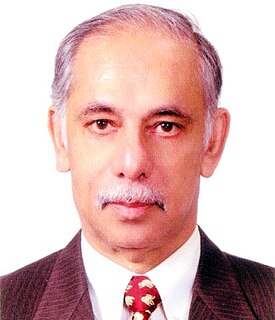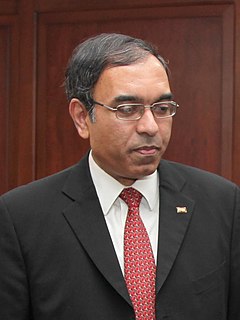Related Research Articles

The Maldives has remained an independent nation throughout its recorded history, save for a brief spell of Portuguese occupation in the mid-16th century. From 1887 to 1965, the country was a British protectorate while retaining full internal sovereignty. At its independence in 1965, the Maldives joined the United Nations on 20 September.

The South Asian Association for Regional Cooperation (SAARC) is the regional intergovernmental organization and geopolitical union of states in South Asia. Its member states are Afghanistan, Bangladesh, Bhutan, India, the Maldives, Nepal, Pakistan and Sri Lanka. The SAARC comprises 3% of the world's area, 21% of the world's population and 4.21% of the global economy, as of 2019.
Armed Forces Special Powers Act (AFSPA), 1958 is an act of the Parliament of India that grant special powers to the Indian Armed Forces the power to maintain public order in "disturbed areas". According to the Disturbed Areas Act, 1976 once declared 'disturbed', the area has to maintain status quo for a minimum of 3 months. One such act passed on 11 September 1958 was applicable to the Naga Hills, then part of Assam. In the following decades it spread, one by one, to the other Seven Sister States in India's northeast. Another one passed in 1983 and applicable to Punjab and Chandigarh was withdrawn in 1997, roughly 14 years after it came to force. An act passed in 1990 was applied to Jammu and Kashmir and has been in force since.

Insurgency in Northeast India involves multiple armed separatist factions operating in India's northeastern states, which are connected to the rest of India by the Siliguri Corridor, a strip of land as narrow as 14.29 miles (23.00 km) wide.

Terrorism in India, according to the Home Ministry, poses a significant threat to the people of India. Compared to other countries, India faces a wide range of terror groups. Terrorism found in India includes Islamic terrorism, separatist terrorism, and left wing terrorism India is one of the countries most impacted by terrorism.

Rehman Sobhan is a Bangladeshi economist and freedom fighter. He played an active role in the Bengali nationalist movement in the 1960s. He was also a member of the first Planning Commission in Bangladesh and a close associate of Sheikh Mujibur Rahman. He was awarded the Independence Day Award in 2008.

The Bay of Bengal Initiative for Multi-Sectoral Technical and Economic Cooperation (BIMSTEC) is an international organisation of seven nations of South Asia and Southeast Asia, housing 1.73 billion people and having a combined gross domestic product of $3.8 trillion (2021). The BIMSTEC member states – Bangladesh, Bhutan, India, Myanmar, Nepal, Sri Lanka, and Thailand – are among the countries dependent on the Bay of Bengal.
The Asian Centre for Human Rights (ACHR) is a NGO dedicated to the promotion and protection of human rights and fundamental freedoms in Asia. It is headquartered in New Delhi, India. The organization seeks to provide timely and accurate information; conducts investigations, research and campaigns and lobbies about country situations or individual cases. It aims to increase the impact of human rights activists and civil society groups; provide input into international standard-setting processes on human rights; provide political, legal and practical advice. It secures cultural, social, and economic rights through rights-based approaches to international development. The centre maintains a particular focus on India, Sri Lanka, Bangladesh, Nepal, Philippines, Afghanistan, Bhutan, Maldives, Pakistan and Thailand. This organisation was founded by Suhas Chakma.
The SAARC Consortium on Open and Distance Learning(SACODiL) is a regional cooperation agency set up under the auspices of the South Asian Association for Regional Cooperation (SAARC) with the objectives of promoting cooperation and collaboration among institutions imparting knowledge through open and distance learning within member states, and promoting its use as a viable and cost-effective method of imparting quality education at all levels.

South Asian University (SAU) is an International University sponsored by the eight Member States of the South Asian Association for Regional Cooperation (SAARC). The eight countries are: Afghanistan, Bangladesh, Bhutan, India, Maldives, Nepal, Pakistan and Sri Lanka. South Asian University started admitting students in 2010, at a temporary campus at Akbar Bhawan, India. Its permanent campus will be at Maidan Garhi in South Delhi, India, next to Indira Gandhi National Open University (IGNOU). First academic session of the university started in August 2010 with two post-graduate academic programmes, in economics and computer sciences. As of 2014, SAU offered Master's and MPhil/PhD programs in applied mathematics, biotechnology, computer science, development economics, international relations, law and sociology. The degrees of the university are recognised by all the member nations of the SAARC according to an inter-governmental agreement signed by the foreign ministers of the eight SAARC member states.

The Asian Forum for Human Rights and Development (FORUM-ASIA) [previously known as Forum-Asia] is a membership-based regional human rights organisation with 81 member organisations in 21 countries across Asia. It is committed to the promotion and protection of all human rights including the right to development.
Mahendra P. Lama is an Indian professor and a development economist who was the pro-vice chancellor of IGNOU and the founding vice chancellor of Sikkim University in India. At the age of 45, he became the youngest vice chancellor of a National Central University in India. He is presently a senior Professor in the School of International Studies, Jawaharlal Nehru University, New Delhi; Chief Economic Adviser in the Government of Sikkim and Member of the Eminent Persons Group on Nepal-India Relations appointed by the Prime Ministers of India and Nepal.

Syed Abdus Samad is a teacher of economics. He has been a faculty member at the University of Dhaka, Boston State College, Boston University, the University of the South Pacific, and the Hankuk University of Foreign Studies, South Korea. Samad has worked as a national and international civil servant, economist, and human rights activist. In Bangladesh, he was the permanent secretary to the Ministry of Energy and Mineral Resources, and a principal secretary to the Prime Minister. Samad is the executive chairman of the Bangladesh Board of Investment.

Secretary-General of the South Asian Association for Regional Cooperation, is head of a SAARC Secretariat, which is headquartered in Kathmandu, Nepal. SAARC is an economic and geopolitical union between the eight South Asian member nations, Afghanistan, Bangladesh, Bhutan, India, Maldives, Nepal, Pakistan and Sri Lanka. Secretary-General is appointed for a three-year term by election by a council of Ministers from member states. Secretary-General is assisted by eight deputies, one from each nation, who also reside in Kathmandu. SAARC Secretariat was established in Kathmandu on 16 January 1987 by Bangladeshi diplomat Abul Ahsan, who was its first Secretary-General, and was inaugurated by King Birendra Bir Bikram Shah of Nepal. Since its creation, its member nations have contributed to a total of fourteenth General Secretaries. Sri Lanka's diplomat Esala Weerakoon is the current Secretary-General, having assumed charge on 1 March 2020.
The eighteenth summit of 'South Asian Association of Regional Cooperation' (SAARC) was held in Kathmandu, the capital of Federal Democratic Republic of Nepal during 26–27 November 2014. The theme of the summit was Deeper Integration for Peace and Prosperity, focused on enhancing connectivity between the member states for easier transit-transport across the region. Sushil Koirala, the then Nepalese Prime Minister, was the main host of the event which took place in Rastriya Sabha Griha The summit took place after an interval of three years as the previous summit was held in 2011 in Maldives.
Neidonuo Angami is an Indian social worker and one of the founders of the Naga Mother's Association, a non governmental organization working for remedying the social problems in Nagaland, India. She is reported to have been selected as one of the 1000 women shortlisted for the Nobel Peace Prize for 2005. She was honored by the Government of India, in 2000, with the fourth highest Indian civilian award of Padma Shri.

Neighbourhood First Policy of India, a core component of India's foreign policy, focuses on peaceful relations and collaborative synergetic co-development with its South Asian neighbors of the Indian subcontinent encompassing a diverse range of topics, such as economic, technology, research and education, connectivity, space program, defence security, environment and climate challenge. This policy creates new avenues as well as leverages existing regional cooperation initiatives, such as SAARC, SASEC, BBIN, and BIMSTEC. It compliments India's Look East policy focused on Southeast Asia and Look West Policy focused on Middle East.

The Bangladesh, Bhutan, India, Nepal (BBIN) Initiative is a subregional architecture of countries in Eastern South Asia, a subregion of South Asia. It meets through official representation of member states to formulate, implement and review quadrilateral agreements across areas such as water resources management, connectivity of power, transport, and infrastructure.

South Asia Foundation (SAF) was founded by UNESCO Goodwill Ambassador Madanjeet Singh in 2000. The South Asia Foundation (SAF) is a secular, non-profit and non-political organization, comprising eight autonomous chapters: Afghanistan, Bangladesh, Bhutan, India, Maldives, Nepal, Pakistan and Sri Lanka.
References
- ↑ "South Asia Forum for Human Rights (SAFHR)". www.safhr.org. Retrieved 2019-06-05.
- ↑ "Focus on Human Rights Organisations: South Asia Forum for Human Rights (SAFHR)," Asia-Pacific Journal on Human Rights & the Law; 2002, Vol. 3 Issue 1, p132-136
- ↑ http://www.wcl.american.edu/hrbrief/v4i2/saarc42.htm [ dead link ]